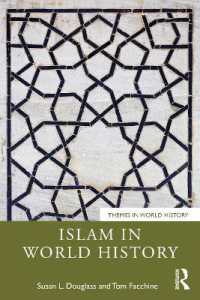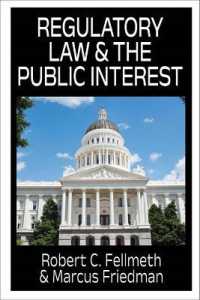- ホーム
- > 洋書
- > 英文書
- > Politics / International Relations
Full Description
Northern Ireland's political system is dominated by an Irish Catholic nationalist versus British Protestant unionist faultline, based upon the long-running argument over whether the region should remain part of the United Kingdom or form part of a United Ireland. Yet the largest category of elector in Northern Ireland says they are neither a unionist nor a nationalist and the third most popular political party is now Alliance, which is not aligned to either of the two traditional constitutional positions.
Drawing upon a unique in-depth survey of its members, this volume analyses the history and contemporary rise of Alliance and the surge of a centrist party in Northern Irish politics which is challenging the old order. How has a party which eschews ethnic bloc politics, has no constitutional preference, and contains a mix of Catholics, Protestants, and many of no religion come to prominence in a polity whose political institutions are framed upon an old binary divide?
The Alliance Party of Northern Ireland undertakes an extensive membership survey analysing the role of a non-ethnic party in an ethnic system, assessing Alliance identities, politics, and futures. Can Alliance integrate Northern Irish society through shared education and housing or will continuing polarisation thwart the Party's project? Would Alliance take a position in the event of a constitutional referendum on Northern Ireland's future - and what might that stand be? These and other key questions form part of a novel study of the party of Northern Ireland's often overlooked centre ground. The volume is essential reading for those wanting to understand how non-ethnic parties can survive and even thrive within an ethnic party system.
Contents
List of Figures
List of Tables
List of Abbreviations
Authors
Introduction
1: Founders, principles, and early years
2: Alliance and the Anglo-Irish Agreement
3: Peace and the Good Friday Agreement
4: From precarity to progress: Beyond the Good Friday Agreement
5: Centrism: Marginalization, opportunities, ideology, and roles
6: The constitutional question
7: Who are the members?
8: Elections and voters
9: Identities
10: Religion, education, and social issues
11: Diversity and representation
12: Reforming politics
Conclusion
Appendix: Membership survey data tables
List of Focus Groups
List of Interviewees
References
Index








